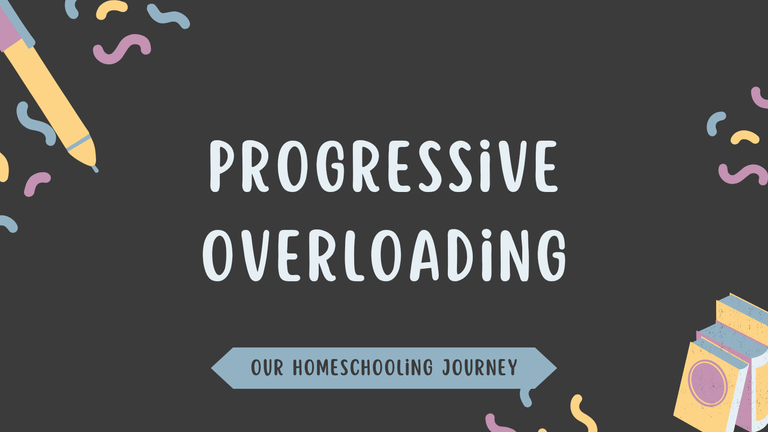
I learned something while browsing for workout and mobility exercises. Progressive overloading. Gradually increasing the intensity or difficulty level of your workout exercises. Basically, what you do is start with something easy to do or lift. If I want to be able to lift 20KG, I don't start with the full 20KG right away. There is a huge chance I'll get injured or burnt out of I do that. Of I want to be able to do a full split, I'd start with a lot of hip openning exercises first, gradually increasing the stretch until I reach my goal. The idea is that you slowly and gradually increase either the repitition of your routine or the difficulty level of your stretch without over exerting yourself.
Then I got to thinking that this osn't only applicable in workouts and exercuses. I realized I have been doing it not just in my workouts, but also in my daughter's mental exercises as well.
When we started our formal homeschooling with our current provider, my daughter already knew how to read and write but I knew she could still push further. It scared me though to push her that time because I did not want to scare her away from studying. My goal was for her to love learning. We were on our way but I felt she's starting to be complacent. She needed a challenge so that her brain will be forced to keep on working hard, but not too much.
So we added oral narration. We did this slowly but surely. We started with retelling single sentences. I would read one sentence then ask her to retelk what she heard. When she's already almost parroting the words, I made it 2 sentences. Then I kept adding more amd more sentences and now, she can listen to a whole 4-5 paragraphs and can retell the entire thing in her own words.
We also added a few books that are difficult to read for her. We started reading E. Nesbit's Beautiful Stories from Shakespeare. We all k ow how old English is a bit too flowery with the words they use. This book kept her on her toes. Aside from the story line being either too tragic or too funny for her, the wordings used kept her focusing her attention.
Our History books transitioned from A Child's History of the World to Ob the Shores of the Great Sea, and now to The Discovery of New Worlds. I can't say that it was a smooth transition but we were careful keep it as enjoyable as we possibly can.
Another progressive overloading we did in our homeschooling journeh was our Tagalog lessons. We used to only read English books. By 3rd quarter of her 1st grade, I started reading the tagalog parts of her English-Tagalog books during our lessons. At first, I'd read the Tagalog then I would also read the English parts. Then, when she has gotten used to hearing and listening to the tagalog stories, I would read only the Tagalog parts and challenge her to retell the story in English. Now, she has only a little difficulty in reading tagalog and she can also speak a little bit of it. Soon, she'll be fluent in both English and Tagalog.
We continued this gradual level up on her studies in herrm 2nd grade. This time, she reads the tagalog story, retelks it using as much Tagalog words as she can. Yes, her narration is dual lingual because she needs to practice incorporating Tagalog words in her speech.
I also taught her how to write in cursive because she has shown signs that she is now ready for the next level. She wants to learn calligraphy but we will move to that skill a little bit later once she's.got her cursive writing mastered. Wr don't want to move up too fast too soon. It's going to make us lose our momentum. The build up has to be made first.
Progressive overloading is a great solution to the problem of getting at a plateau in whatever field you are pursuing. You just have to make proper observations so you can recognize if the task at hand seem a little less challenging already. Our brain, just like our muscles needs continuous workouts. Jt needs just the right amount of challenge to keep it working properly. Keep giving the brain easy tasks and it would be complacent. Give it too much challenge and it will result to stress and burn out.
Practicing progressive overloading helps maintain the consistency of one's rhythm but also makes sure that everyday tasks do not become monotonous. It encourages a continuous upward slope of development while completely avoiding the strain, fatigue, and stress. It is a healthy way of pushing one's self towards progress and improvement without overstressing and overworking oneself.




I think we're all applying this mostly in life!
Even when I am studying, I focus more on basics then proceed in solving harder problems:)
Yep. That's the best way to tackle it, especially for maths. But there are people who are impatient amd wants to take on too many too soon. That's what causes the stress. We should only take it slow, one level at a time.
Take it one step at a time. Something I always tell myself, once you've got the hang of it, everything will be easy.
Ate, I know for sure that you're daughter will be a good writer and speaker one day with all the efforts that you are making to impart knowledge to her.
Yep, and once it feels like it's too easy already, that's when you know you are ready to push further. Sabi nga sa Milo "great things start from small beginnings." and those small beginnings are integral. Never skip those small steps. :)
Great insights on progressive overloading! It's fascinating how you've applied this concept not just in workouts but also in homeschooling. Gradually increasing challenges while keeping things enjoyable is a fantastic approach. Your daughter's progress in narration, reading, and bilingual skills is impressive. It's a reminder that steady, incremental improvements can lead to significant growth. Thanks for sharing!
Wow
Using Tagalog stories for your teaching makes so much sense
I like that!